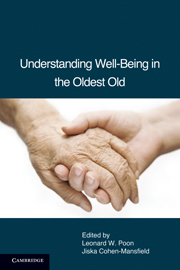Book contents
- Frontmatter
- Contents
- List of Tables
- List of Contributors
- Foreword by Carol D. Ryff
- PART I THEORY: NEW HORIZONS IN WELL-BEING RESEARCH
- 1 Toward New Directions in the Study of Well-Being among the Oldest Old
- 2 From Ageless Self to Selfless Age: Toward a Theoretical Turn in Gerontological Understanding
- 3 The Pursuit of Happiness: Alternative Conceptions of Subjective Well-Being
- 4 The Shifting Baseline Theory of Well-Being: Lessons from across the Aging Spectrum
- 5 The Model of Developmental Adaptation: Implications for Understanding Well-Being in Old-Old Age
- PART II PARADISE LOST: BETWEEN TRAUMA AND HAPPINESS
- PART III PATHWAYS AND GATEKEEPERS: MODERATING, MEDIATING, AND PROXIMAL PROCESSES
- PART IV SIGNPOSTING PARADISE: MEASUREMENT OF WELL-BEING
- Index
- References
4 - The Shifting Baseline Theory of Well-Being: Lessons from across the Aging Spectrum
Published online by Cambridge University Press: 05 August 2012
- Frontmatter
- Contents
- List of Tables
- List of Contributors
- Foreword by Carol D. Ryff
- PART I THEORY: NEW HORIZONS IN WELL-BEING RESEARCH
- 1 Toward New Directions in the Study of Well-Being among the Oldest Old
- 2 From Ageless Self to Selfless Age: Toward a Theoretical Turn in Gerontological Understanding
- 3 The Pursuit of Happiness: Alternative Conceptions of Subjective Well-Being
- 4 The Shifting Baseline Theory of Well-Being: Lessons from across the Aging Spectrum
- 5 The Model of Developmental Adaptation: Implications for Understanding Well-Being in Old-Old Age
- PART II PARADISE LOST: BETWEEN TRAUMA AND HAPPINESS
- PART III PATHWAYS AND GATEKEEPERS: MODERATING, MEDIATING, AND PROXIMAL PROCESSES
- PART IV SIGNPOSTING PARADISE: MEASUREMENT OF WELL-BEING
- Index
- References
Summary
ABSTRACT
The concept of well-being in old age is both complex and elusive. Over the course of gerontological research, numerous terminologies have emerged attempting to capture and describe this concept. In this paper, the Shifting Baseline Theory, a new theory of well-being in older persons, is presented, along with significant implications for assessment and practice, and for research of well-being across the geriatric landscape. The Shifting Baseline Theory consists of four principles: (1) Multiple levels of well-being exist at any given time, (2) Well-being is affected by both a trait and a state component, (3) People tend to return to their baseline level of well-being after changes in their baseline level of function or living conditions, and (4) There are specific exceptions to returning to the well-being baseline, such as cases in which a new functional baseline emerges that involves physical pain. This paper presents examples from the literature and research findings that support the Shifting Baseline Theory, and distinguishes it from other theories dealing with well-being in old age. Lastly, this paper examines the implications of this theory for the prioritization of policies, the assessment of quality of life, the agenda for well-being research, and the goals and practices of dementia care. This examination demonstrates the Shifting Baseline Theory's unique emphasis on the experience of daily living, rather than on the individual's objective physical state, as a determinant of well-being.
Information
- Type
- Chapter
- Information
- Understanding Well-Being in the Oldest Old , pp. 46 - 64Publisher: Cambridge University PressPrint publication year: 2011
References
Accessibility standard: Unknown
Why this information is here
This section outlines the accessibility features of this content - including support for screen readers, full keyboard navigation and high-contrast display options. This may not be relevant for you.Accessibility Information
- 6
- Cited by
